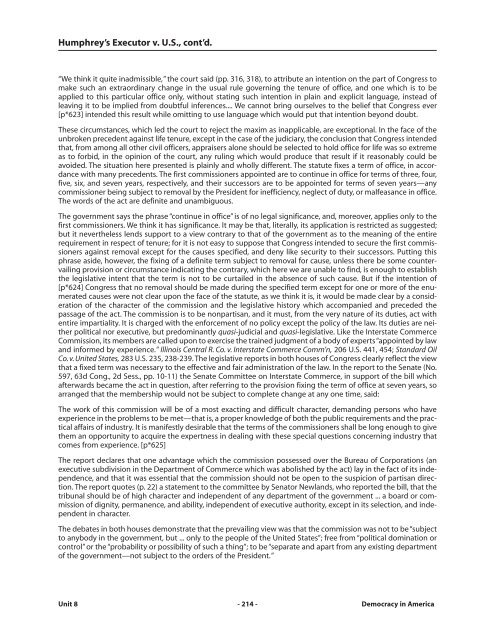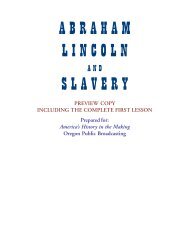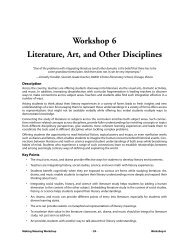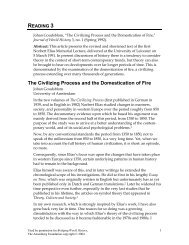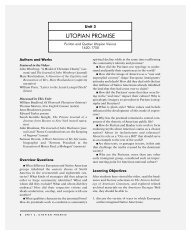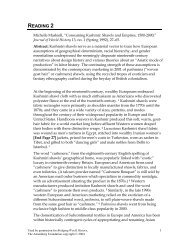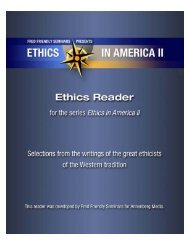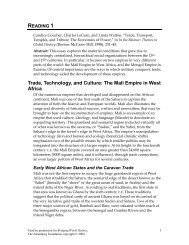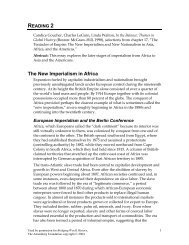Download Unit 8 Readings, Bureaucracy: A Controversial Necessity
Download Unit 8 Readings, Bureaucracy: A Controversial Necessity
Download Unit 8 Readings, Bureaucracy: A Controversial Necessity
Create successful ePaper yourself
Turn your PDF publications into a flip-book with our unique Google optimized e-Paper software.
Humphrey’s Executor v. U.S., cont’d.<br />
“We think it quite inadmissible,” the court said (pp. 316, 318), to attribute an intention on the part of Congress to<br />
make such an extraordinary change in the usual rule governing the tenure of office, and one which is to be<br />
applied to this particular office only, without stating such intention in plain and explicit language, instead of<br />
leaving it to be implied from doubtful inferences.... We cannot bring ourselves to the belief that Congress ever<br />
[p*623] intended this result while omitting to use language which would put that intention beyond doubt.<br />
These circumstances, which led the court to reject the maxim as inapplicable, are exceptional. In the face of the<br />
unbroken precedent against life tenure, except in the case of the judiciary, the conclusion that Congress intended<br />
that, from among all other civil officers, appraisers alone should be selected to hold office for life was so extreme<br />
as to forbid, in the opinion of the court, any ruling which would produce that result if it reasonably could be<br />
avoided. The situation here presented is plainly and wholly different. The statute fixes a term of office, in accordance<br />
with many precedents. The first commissioners appointed are to continue in office for terms of three, four,<br />
five, six, and seven years, respectively, and their successors are to be appointed for terms of seven years—any<br />
commissioner being subject to removal by the President for inefficiency, neglect of duty, or malfeasance in office.<br />
The words of the act are definite and unambiguous.<br />
The government says the phrase “continue in office” is of no legal significance, and, moreover, applies only to the<br />
first commissioners. We think it has significance. It may be that, literally, its application is restricted as suggested;<br />
but it nevertheless lends support to a view contrary to that of the government as to the meaning of the entire<br />
requirement in respect of tenure; for it is not easy to suppose that Congress intended to secure the first commissioners<br />
against removal except for the causes specified, and deny like security to their successors. Putting this<br />
phrase aside, however, the fixing of a definite term subject to removal for cause, unless there be some countervailing<br />
provision or circumstance indicating the contrary, which here we are unable to find, is enough to establish<br />
the legislative intent that the term is not to be curtailed in the absence of such cause. But if the intention of<br />
[p*624] Congress that no removal should be made during the specified term except for one or more of the enumerated<br />
causes were not clear upon the face of the statute, as we think it is, it would be made clear by a consideration<br />
of the character of the commission and the legislative history which accompanied and preceded the<br />
passage of the act. The commission is to be nonpartisan, and it must, from the very nature of its duties, act with<br />
entire impartiality. It is charged with the enforcement of no policy except the policy of the law. Its duties are neither<br />
political nor executive, but predominantly quasi-judicial and quasi-legislative. Like the Interstate Commerce<br />
Commission, its members are called upon to exercise the trained judgment of a body of experts “appointed by law<br />
and informed by experience.” Illinois Central R. Co. v. Interstate Commerce Comm’n, 206 U.S. 441, 454; Standard Oil<br />
Co. v. <strong>Unit</strong>ed States, 283 U.S. 235, 238-239. The legislative reports in both houses of Congress clearly reflect the view<br />
that a fixed term was necessary to the effective and fair administration of the law. In the report to the Senate (No.<br />
597, 63d Cong., 2d Sess., pp. 10-11) the Senate Committee on Interstate Commerce, in support of the bill which<br />
afterwards became the act in question, after referring to the provision fixing the term of office at seven years, so<br />
arranged that the membership would not be subject to complete change at any one time, said:<br />
The work of this commission will be of a most exacting and difficult character, demanding persons who have<br />
experience in the problems to be met—that is, a proper knowledge of both the public requirements and the practical<br />
affairs of industry. It is manifestly desirable that the terms of the commissioners shall be long enough to give<br />
them an opportunity to acquire the expertness in dealing with these special questions concerning industry that<br />
comes from experience. [p*625]<br />
The report declares that one advantage which the commission possessed over the Bureau of Corporations (an<br />
executive subdivision in the Department of Commerce which was abolished by the act) lay in the fact of its independence,<br />
and that it was essential that the commission should not be open to the suspicion of partisan direction.<br />
The report quotes (p. 22) a statement to the committee by Senator Newlands, who reported the bill, that the<br />
tribunal should be of high character and independent of any department of the government ... a board or commission<br />
of dignity, permanence, and ability, independent of executive authority, except in its selection, and independent<br />
in character.<br />
The debates in both houses demonstrate that the prevailing view was that the commission was not to be “subject<br />
to anybody in the government, but ... only to the people of the <strong>Unit</strong>ed States”; free from “political domination or<br />
control” or the “probability or possibility of such a thing”; to be “separate and apart from any existing department<br />
of the government—not subject to the orders of the President.”<br />
<strong>Unit</strong> 8 - 214 - Democracy in America


